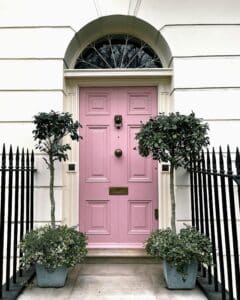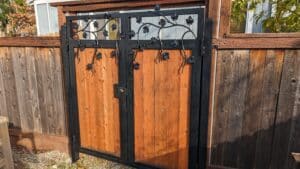As someone who has encountered various types of fences in my line of work, I’ve developed a unique appreciation for the qualities that make a good fence – not just in terms of appearance but also in terms of longevity and ease of maintenance. Vinyl fences, in particular, have caught my attention for their sleek look and low upkeep. In this post, we’ll dive into what vinyl fencing is, how it stands up against other materials like wood and metal, and most importantly, how long you can expect a vinyl fence to last. Whether you’re considering installing one or are just curious about this modern fencing option, this post aims to provide you with practical, firsthand insights.
Understanding Vinyl Fences
Definition and Description of Vinyl as a Fencing Material Vinyl fencing, also known as PVC (Polyvinyl Chloride) fencing, is a synthetic plastic-based material that has gained significant popularity in the fencing industry. Its composition includes a combination of various elements like chlorine, derived from salt, and ethylene, obtained from natural gas. The resulting product is a strong, flexible, and resilient material perfect for crafting fences. Unlike traditional materials, vinyl is manufactured in a variety of styles, colors, and textures, allowing it to mimic the appearance of wood or other materials while offering distinct properties.
Comparison with Other Common Fencing Materials
- Vinyl vs. Wood:
- Durability: Unlike wood, vinyl does not rot, warp, or splinter over time, making it more durable in various weather conditions.
- Maintenance: Wood fences require regular staining or painting to maintain their appearance and prevent decay, whereas vinyl fences need only occasional cleaning.
- Cost: Initially, vinyl can be more expensive than wood, but the lower maintenance costs over time can make it more cost-effective in the long run.
- Vinyl vs. Metal:
- Rust and Corrosion: Metal fences, especially those made of iron or steel, are prone to rust and corrosion, whereas vinyl is naturally resistant to these issues.
- Style Variability: Metal fences often have a more industrial or classic appearance, while vinyl offers more versatility in mimicking different styles, including wood and ornamental designs.
- Temperature Resistance: Metal fences can become extremely hot to the touch in sunny conditions, whereas vinyl maintains a more consistent temperature.
Benefits of Choosing Vinyl
- Low Maintenance: Vinyl fences do not require painting, staining, or sealing. They are easily cleaned with soap and water, making them ideal for those who prefer a low-maintenance property solution.
- Aesthetics: Vinyl fencing is available in a variety of styles, colors, and finishes. It can complement any property style, from traditional to contemporary, and can even mimic the look of natural wood.
- Durability and Longevity: Vinyl is highly resistant to elements like UV rays, moisture, and temperature changes, contributing to its long lifespan compared to wood and some metals.
- Eco-Friendly Options: Some vinyl fences are made from recycled materials, making them a more sustainable option. Additionally, vinyl is a non-toxic material as it doesn’t require preservatives or chemicals for maintenance.
- Easy Installation: Vinyl fences often come in pre-assembled panels, making installation quicker and easier compared to some other fencing materials.
In summary, vinyl fencing emerges as a robust, versatile, and practical choice for both residential and commercial properties. Its combination of durability, aesthetic flexibility, and low maintenance requirements make it a worthy consideration for anyone looking to install a fence.
Factors Affecting the Longevity of Vinyl Fences
Quality of the Material
- Differences in Vinyl Quality: Not all vinyl is created equal. Higher-quality vinyl is typically more expensive but offers greater UV resistance and durability. Lower-quality vinyl, while more affordable, can become brittle, crack, or fade over time, especially under harsh weather conditions.
- Impact on Durability: High-quality vinyl can last for decades without significant wear and tear. It’s essential to invest in good quality vinyl to ensure that your fence withstands the test of time and elements.
Weather and Environmental Conditions
- Temperature Fluctuations: Vinyl fences are generally resistant to weather changes. However, extreme temperatures can cause low-quality vinyl to expand or contract, leading to cracks or warping.
- Sunlight and UV Exposure: Prolonged exposure to sunlight can fade lower-quality vinyl. Higher-grade vinyl fences are usually treated with a UV inhibitor to prevent fading and maintain color consistency.
- Rain, Snow, and Humidity: Vinyl is water-resistant, making it an excellent choice in humid or rainy climates. However, standing water at the base can lead to issues, so proper drainage is crucial.
Installation Process
- Importance of Proper Installation: A well-installed vinyl fence can significantly enhance its longevity. Improper installation can lead to sagging panels, misalignment, and increased vulnerability to damage.
- Personal Insights: In my experience, ensuring that posts are set at the correct depth and using the right hardware is crucial. Even the best vinyl material can fail if not installed correctly.
Maintenance Tips for Vinyl Fences
Regular Cleaning Practices
- Routine Cleaning: Regular cleaning can maintain the appearance and longevity of your vinyl fence. A simple mixture of soap and water is often enough to clean off dirt and grime.
- Avoiding Harsh Chemicals: Harsh chemicals or abrasive cleaners can damage the vinyl surface. Stick to gentle cleaning solutions to protect the fence’s integrity.
Repairing Minor Damages
- DIY Fixes: Small cracks or holes can often be repaired using PVC glue or a vinyl fence repair kit. These kits are available at most hardware stores and can be a quick fix for minor issues.
- Replacing Sections: For larger damages, it may be necessary to replace entire sections of the fence. This is typically a straightforward process, as vinyl fences are often designed with interchangeable parts.
When to Seek Professional Help
- Recognizing Serious Problems: If you notice significant warping, large cracks, or structural issues, it’s time to call in a professional. While vinyl is low-maintenance, major repairs or replacements should be handled by someone with experience in fence installation and repair.
- Regular Inspections: Having a professional periodically inspect your fence can help catch potential problems early, ensuring your fence remains in top condition for years to come.
Expected Lifespan of Vinyl Fences
Average Lifespan Based on Industry Standards
- The lifespan of a vinyl fence can vary significantly based on quality and conditions, but on average, a well-made and properly installed vinyl fence can last anywhere from 20 to 30 years or more. Higher-grade vinyl products often come with warranties that may range from 20 years to a lifetime, reflecting the manufacturer’s confidence in the product’s durability.
Personal Observations on Longevity
- In my experience, vinyl fences in residential areas tend to last on the higher end of the spectrum, especially when homeowners are diligent with minimal maintenance. In harsher climates or high-traffic commercial areas, the lifespan might lean towards the lower end, but still impressively outlasts many wood or metal fencing options.
Cost vs. Value Analysis
Initial Cost vs. Long-Term Savings
- Initial Cost: Vinyl fencing is generally more expensive upfront than some other materials, particularly wood. The initial investment covers the cost of materials and installation, with higher-grade vinyl costing more due to its increased durability and aesthetic options.
- Long-Term Savings: Despite the higher initial cost, vinyl fencing often proves to be more cost-effective in the long run. Its minimal maintenance requirements eliminate the need for frequent repairs or replacements. There’s no need for repainting or staining, and cleaning supplies are inexpensive and easy to use. When you consider the longevity and low maintenance costs, vinyl fencing often offers significant long-term savings.
Resale Value Impact
- Enhanced Curb Appeal: A well-maintained vinyl fence can significantly enhance the curb appeal of a property, making it more attractive to potential buyers. Its modern and clean look, along with the perception of a low-maintenance future, can positively impact the resale value.
- Perceived Value: Homebuyers appreciate the durability and low maintenance of vinyl fencing, seeing it as a value-add to the property. While it might not have the same rustic charm as a wood fence for some buyers, the practical benefits often sway opinions in favor of vinyl.
- Long-Term Desirability: As more homeowners recognize the benefits of vinyl fencing, its desirability continues to grow. A home with a vinyl fence might sell quicker or for a better price, reflecting the market’s appreciation for durable, low-maintenance, and aesthetically pleasing fencing solutions.
In conclusion, vinyl fencing stands out as a robust and practical choice for both residential and commercial properties, blending aesthetics, durability, and ease of maintenance into one appealing package. The long lifespan of vinyl, ranging from 20 to 30 years, coupled with its resistance to common environmental stressors, makes it a wise investment for anyone looking to enhance their property. From my personal experience in the field, the longevity and resilience of vinyl fencing in various settings have consistently impressed me.
The initial cost of vinyl fencing, though higher than some alternatives, is offset by its long-term savings. The minimal maintenance requirements not only save time and effort but also reduce the ongoing financial commitment typically associated with fencing. Additionally, the potential increase in property value and curb appeal is a significant factor to consider, making vinyl fencing an investment that pays dividends in both aesthetics and practicality.
As we wrap up this discussion, it’s clear that the benefits of vinyl fencing are manifold. Its ability to withstand the test of time, maintain its appearance with minimal effort, and enhance property value makes it a top contender in the world of fencing solutions. Whether you’re a homeowner, a property developer, or someone in the market for a new fence, vinyl fencing deserves your consideration for its blend of style, strength, and simplicity.


